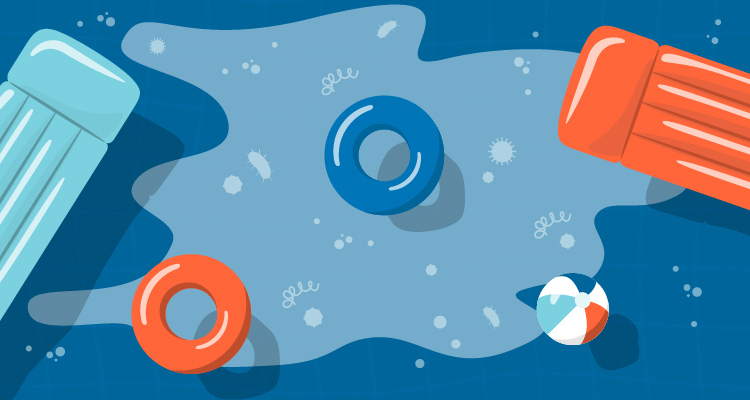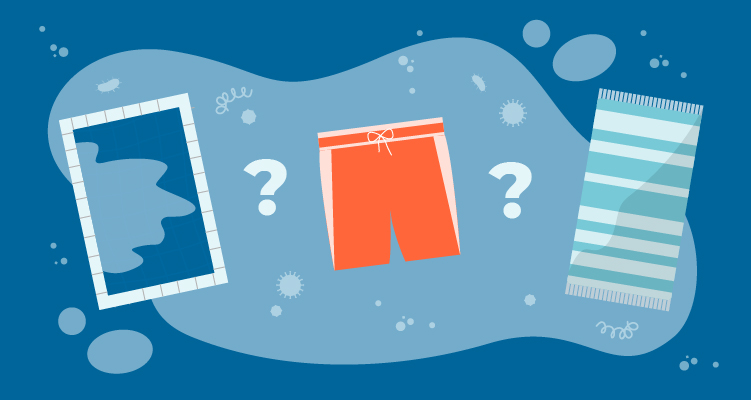The sun is shining and the smell of barbecue fills the air–a perfect day for swimming–and the last thing you want to worry about is whether you can get an STD from a swimming pool. There is a multitude of STD myths that circulate the internet and everyday conversation, to the point where it can be difficult sometimes to discern fact from fiction. But we’re here to set the record straight!
So, can you get an STD from a swimming pool? As always, if you should be experiencing symptoms, it is recommended that you visit your healthcare provider or local STD testing center to provide a solid diagnosis. But, by providing extra context to this question, we hope to relieve your mind of anxiety.
Is it possible to get an STD from a public pool?
The short answer is no, it is unlikely for anyone to get an STD such as gonorrhea, chlamydia or hepatitis B from a swimming pool or hot tub. But there’s a bit more to it. While many infections can be transmitted in a pool or hot tub setting, such as a cryptosporidium infection (usually transmitted through fecal matter), they are most commonly spread in pools that would not pass a public pool, hot tub and spa inspection.1,2 Bacteria and viruses have a much harder time growing in pools or hot tubs that are treated properly with the right levels of chlorine and brought to safe PH levels.
As long as individuals’ bodily fluids stay inside their body and the pool water is properly treated per guidelines, such as The Model Aquatic Health Code, transmission is unlikely.3 While you most likely won’t contract an STD from merely swimming in a pool or hot tub, engaging in sexual activities while in the pool introduces risk.
Sexual Health Tips for Pools and Hot Tubs
With this knowledge in mind, there are a variety of steps that you can take to ensure that the risk of catching any type of water-borne infection (STD or not) is at a minimum. Along with the recommended routine STD testing, showering after swimming, drying your ears, visiting recreational pools with regular cleaning inspections and keeping a personal towel are all great habits to form.
Below are some frequently asked questions and sexual health tips in regards to public pools and hot tubs.
Can you get an STD from sharing a swimming pool?
Answer: Casual swimming in a public pool has not been shown to present a risk of STD transmission.
Can STDs survive in water?
Answer: Yes, technically, some STDs can survive in water. However, due to various factors such as water treatment and dilution, it is very unlikely for water to be a strict method of transmission.
What infections can swimming pools carry?
Answer: The Centers for Disease Control and Prevention reports that the most common recreational water infections include,4
- Cryptosporidium
- Legionella
- Pseudomonas
- Norovirus
- Shigella
What is the risk of sexual activities in a pool or hot tub?
Answer: Sexual contact in general always comes with some level of risk, including that in swimming pools or hot tubs. This is because contact with the permeable membranes of the vagina or penis opens up the possibility that such contact may transfer infection from one person to another.
Can STDs pass through bathing suits?
Answer: Bodily fluids are one of the main carriers of STDs, and realistically, bodily fluids can pass through bathing suits. It is unlikely to contract an STD from water passing through a bathing suit as you casually swim, but infected bodily fluid could potentially pass through bathing suits if there is sexual contact involved.
Can you get an STD from a beach towel?
Answer: While it is not as likely as direct sexual contact, trichomoniasis has been known to pass through sharing damp towels or bathing suits, as explained by the Naval Medical Center Portsmouth.5
Conclusion
In conclusion, as long as you are visiting swimming pools that are regularly cleaned, avoid sexual contact while in the water and keep your own pool towel, STDs should not be a concern. Concern for your sexual health is always encouraged, and it can be difficult when fact blends with fiction.
Some other common questions that stem from sexual health misunderstandings include:
- Can You Get an STD From Trying on Bathing Suits?
- Can Mosquitoes Transmit HIV?
- Can You Catch Herpes From A Toilet Seat?
- Can You Get Herpes From Kissing?
- Can You Get Herpes From Sharing A Drink?
- Can STDs Go Away On Their Own?
We hope that these resources should help answer your questions regarding STDs, sexual health and preventative measures. Can you get an STD from swimming pools? No, not from recreational swimming, but there are plenty of STD testing centers near you that offer quick, easy and stress-free testing options to ease your worries if you should have your doubts.
Sources
- “Model Aquatic Health Code: General Information.” Centers for Disease Control and Prevention. Centers for Disease Control and Prevention, July 18, 2018. www.cdc.gov/mahc/general-information.html
- “Pool & Hot Tub/Spa Inspections.” Centers for Disease Control and Prevention. Centers for Disease Control and Prevention, May 4, 2016. www.cdc.gov/healthywater/swimming/public-health-professionals/pool-hot-tub-inspections.html
- “The Model Aquatic Health Code (MAHC).” Centers for Disease Control and Prevention. Centers for Disease Control and Prevention, January 19, 2021. www.cdc.gov/mahc/index.html
- “Recreational Water Illnesses.” Centers for Disease Control and Prevention. Centers for Disease Control and Prevention, June 4, 2020. www.cdc.gov/healthywater/swimming/swimmers/rwi.html
- “Trichomoniasis Fact Sheet.” Naval Medical Center Portsmouth, Accessed March 28, 2022. portsmouth.tricare.mil/Portals/130/Trichomoniasis.pdf


